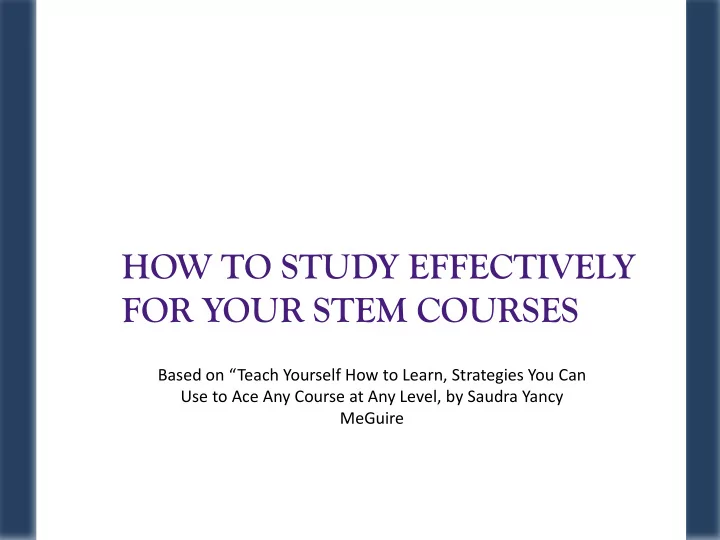

HOW TO STUDY EFFECTIVELY FOR YOUR STEM COURSES Based on “Teach Yourself How to Learn, Strategies You Can Use to Ace Any Course at Any Level, by Saudra Yancy MeGuire
https://www.slideshare.net/JohnPaulHablado1/cognitive-and-meta-cognitive- strategies-for-problem-solving-in-mathematics
Metacognition The ability to: think about your own thinking be consciously aware of yourself as a problem solver monitor, plan, and control your mental processing (e.g. “Am I understanding this material, or just memorizing it?”) accurately judge your level of learning k now what you know and what you don’t know Flavell, J. H. (1976). Metacognitive aspects of problem solving. In L. B. Resnick (Ed.), The nature of intelligence (pp.231-236). Hillsdale, NJ: Erlbaum
Bloom’s Taxonomy https://www.krausanderson.com/wp-content/uploads/2016/09/Bloom.jpg
Reflection Questions • What’s the difference, if any, between studying and learning ? • For which task would you work harder? A. Make an A on the test B. Teach the material to the class
How do we teach students to move higher on Bloom’s Taxonomy? Teach them the Study Cycle* *adapted from Frank Christ’s PLRS system
The Study Cycle Assess your Learning – Periodically perform reality checks • Am I using study methods that are effective? • Do I understand the material enough to teach it to others? Study – Repetition is the key. Ask questions such as ‘why’, ‘how’, and ‘what if’. • Intense Study Sessions* - 3-5 short study sessions per day • Weekend Review – Read notes and material from the week to make connections Review after class – As soon after class as possible, read notes, fill in gaps and note any questions. Attend class – GO TO CLASS! Answer and ask questions and take meaningful notes. Preview before class – Skim the chapter, note headings and boldface words, review summaries and chapter objectives, and come up with questions you’d like the lecture to answer for you.
Intense Study Sessions 1 Set a 1-2 min Decide what you want to accomplish in Goal your study session Interact with material- organize, Study 30-50 concept map, summarize, process, re- with 2 min read, fill-in notes, reflect, etc. Do Focus homework problems like test problems 3 Reward 10-15 Take a break – call a friend, play a short Yourself min game, get a snack 4 Review 5 min Go over what you just studied
Effective Homework Strategy • Study material first, before looking at the problems/questions • Work example problems (without looking at the solutions) until you get to the answer • Check to see if answer is correct • If answer is not correct, figure out where mistake was made , without consulting solution • Work homework problems/answer questions as if taking a test
Recommend
More recommend